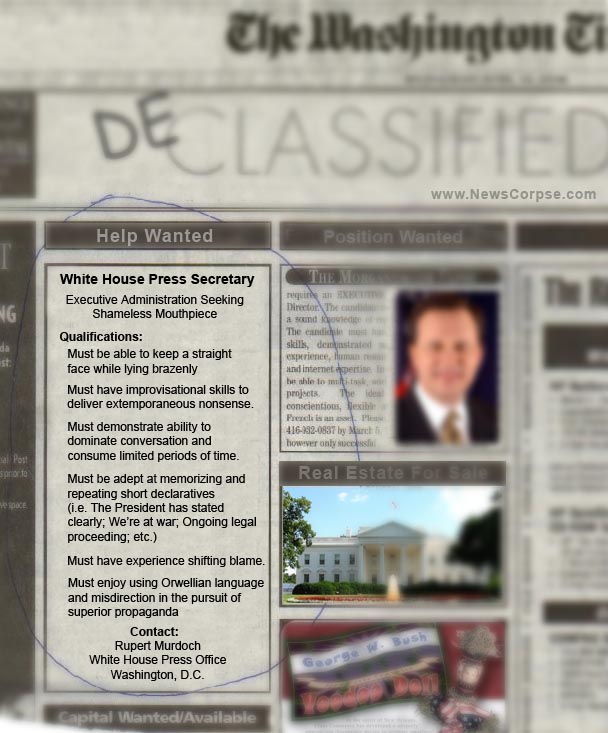 I suppose it was inevitable. Former Poppa Bush speechwriter, current Fox News commentator and Fox Radio talk show host, Tony Snow, been appointed White House Press Secretary. Since Snow has been shilling for the president for years in his current job, a guest on Keith Olbermann’s Countdown recently asked if he would be getting back pay. It must be convenient for the White House to have the farm team at Fox available any time they need a new relief spinner.
I suppose it was inevitable. Former Poppa Bush speechwriter, current Fox News commentator and Fox Radio talk show host, Tony Snow, been appointed White House Press Secretary. Since Snow has been shilling for the president for years in his current job, a guest on Keith Olbermann’s Countdown recently asked if he would be getting back pay. It must be convenient for the White House to have the farm team at Fox available any time they need a new relief spinner.
Amongst the jokes that write themselves when stupefying events like this occur, there are some seriously funny moments to treasure. ThinkProgress has compiled some commentary by Snow that refers to the president as “an embarrassment,” “impotent,” and more. If that’s the kind of counsel he’ll be giving in the Oval Office, this might turn out pretty well after all.
Unfortunately, we can’t expect Snow to be any more honest in his new job than he was in his old one. Media Matters has documented some of the many falsehoods that were a regular feature of his broadcasts.
However, as we bid farewell to Scotty McClellan and welcome Tony to his new digs, we must not forget why this substitution is taking place. The administration is in turmoil:
- They are losing two wars (Afghanistan and Iraq) and rattling their paper sabers at a third (Iran).
- They are defending multiple top-level aides who are under investigation or indictment.
- They are stumbling around trying to deal with record high gas prices.
- They are suffering from ever lower poll numbers and the possible loss of one or both houses of congress in November.
Their solution to this perfect storm of political chaos? A new press secretary!
This game plan clearly holds the hope that the new face will create a diversion. They expect that the White House Press Corpse will honor Snow with a Honeymoon Period. They’re going to say, “He needs to get his bearings and figure out which drawer the paper clips are in. Give him a break.”
Well I say Hell No! He is a veteran of both the media and the White House. If he can’t do the job he shouldn’t have been appointed. There are too many critical issues facing the country to allow precious time to slip away. We need answers to the questions raised above and others, like health care, tax fairness, immigration, wiretapping, global warming, and on and on. It is the Press Corpse’s job to elicit these answers from our representatives and they better damn well do it.




 Reporters Without Borders has just released its
Reporters Without Borders has just released its